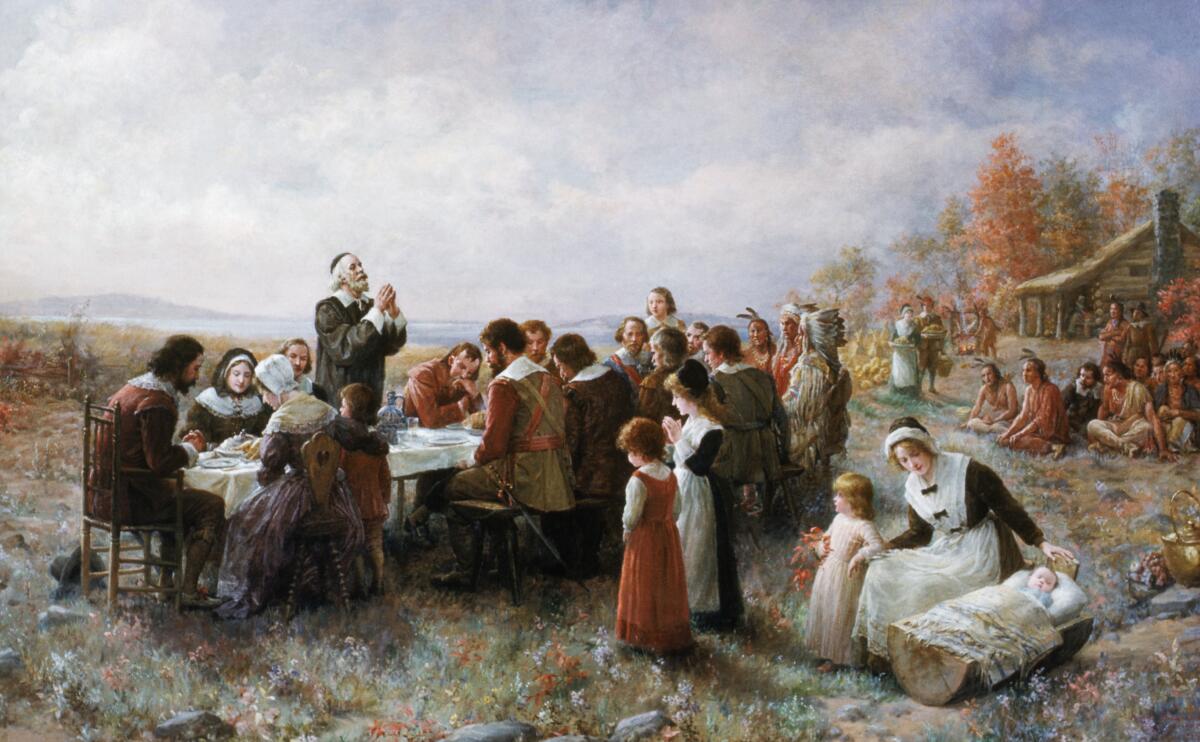Letters to the Editor: Thanksgiving has a brutal history. Can we still celebrate it?

- Share via
To the editor: I agree with Peter C. Mancall’s focus on the cruelty shown by Puritan colonists toward Indigenous peoples in the 17th century. That said, for me, I’m not at all focused on the twisted history of Thanksgiving.
However, when we gather on Thanksgiving there is a general connection to the idea that things were very tough for those Puritans who came to New England first, and for the Native Americans they encountered.
More importantly, I use Thanksgiving as a wonderful time to get together in a traditional way with my two brothers, my sister and their families. Thanksgiving for me is simply a time to journey a long way to be with family.
Paul Fernandez, Cerritos
..
To the editor: It is indeed time to understand and accept the true meaning of Thanksgiving.
As children we were spoon-fed the myth of the Pilgrims and Indians enjoying a feast to commemorate a successful comingling of communities. The ensuing massacre of entire Pequot communities and the enslavement of survivors was left unspoken.
President Lincoln established Thanksgiving as a national holiday for the purpose of unifying the nation during the Civil War. His proclamation made no mention of the Pilgrim-Indian feast.
After centuries of persistent prejudice in this country and near-constant mass shootings, I believe it is time to reconsider Thanksgiving. The name and concept will never be changed because of the potential blowback, but each of us should consider it a traditional day of mourning for what’s taken place in the past.
Richard C. Armendariz, Huntington Beach
..
To the editor: Seemingly every year we get an article like this, about how the “first Thanksgiving” that took place in the Plymouth colony in 1621 was really the forerunner of European cruelty toward Indigenous people.
I do not in any way disagree with Mancall’s reference to the Mashpee uprising starting in 1833 and the extermination by the Puritans (though not from the Plymouth colony) of the Pequot in 1637.
But it is worth noting the Plymouth Pilgrims’ relationship with the Wampanoag, who were their guests at that first Thanksgiving and their allies for nearly 50 years. They supported the Puritan War and did not grieve the destruction of the Pequot.
The separatists who created the colony at Plymouth, whom we call the Pilgrims, were happy to accept an alliance with the Wampanoag, led by the great chief Massasoit. That alliance lasted the rest of Massasoit’s life.
So that first Thanksgiving, attended by 53 survivors of the Mayflower and 90 Wampanoag people, was a bit more than a “historic aberration.” It was a failed expression of hope for goodwill in the future.
Erica Hahn, Monrovia
..
To the editor: Thanksgiving was a celebration of the harvest long before 1621. It is mentioned in the Old Testament, and harvest celebrations were common in Europe before the Pilgrims in Plymouth.
In the United States, George Washington and later John Adams proclaimed a day of Thanksgiving, but Thomas Jefferson stopped the tradition because he felt it was a religious celebration.
Lincoln issued a Thanksgiving proclamation to celebrate the great Civil War victories. It was celebrated inconsistently until it finally was made a national holiday during the Franklin D. Roosevelt administration.
For the United States, it is a special day of blessing that should not be forgotten or renamed.
M. Mark Hoffer, Long Beach
..
To the editor: After absorbing Mancall’s historic truths about the first Thanksgiving and its bloody aftermath, I wonder if the traditional feast day could become an opportunity to reach out to Native Americans in need.
It would be a commitment to remember the facts of our nation’s rugged foothold and better understand the Indigenous peoples our ancestors displaced.
Stephen Pouliot, Venice



